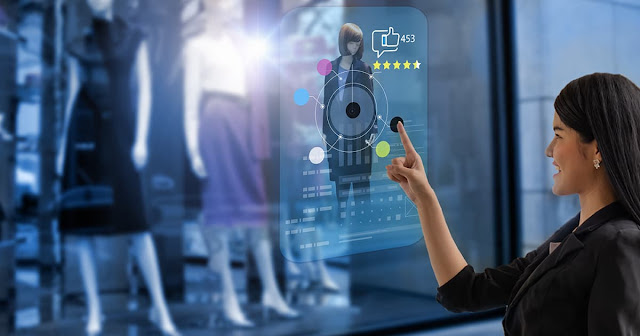
The retail industry is undergoing a
profound transformation, thanks to the integration of Artificial Intelligence
(AI). From optimizing inventory management to enhancing customer experiences,
AI is revolutionizing the way retailers operate. In this comprehensive article,
we will explore the numerous benefits of AI in the retail industry, shedding light on how this
technology is shaping the future of shopping.
Understanding the AI Revolution in Retail
Before we delve into the benefits of
AI in the retail sector, let's first understand the AI revolution and its
significance.
AI's Rapid Advancements:AI technologies, such as machine learning, natural language processing,
and computer vision, have advanced at an unprecedented rate. This has made AI
more accessible and practical for retailers of all sizes.
Data-Driven Insights:AI thrives on data, and the retail industry generates vast amounts of
data every day. AI can process and analyze this data to extract valuable
insights that drive business decisions.
Customer-Centric Approach:AI enables retailers to adopt a customer-centric approach,
tailoring products and services to individual preferences and needs. This personalized
shopping experience is a game-changer for retailers.
Now, let's explore the benefits of AI
in the retail industry.
Benefits of AI in Retail
1. Personalized Shopping Experience:
AI-powered recommendation engines
analyze customer data to suggest products and services based on individual
preferences and past behavior. This personalized approach enhances the
customer's shopping experience and increases the likelihood of making a
purchase.
2. Inventory Management and Demand Forecasting:
AI algorithms can predict demand
patterns and optimize inventory management. Retailers can reduce overstocking
and understocking issues, resulting in cost savings and improved customer
satisfaction.
3. Dynamic Pricing:
AI helps retailers adjust prices in
real-time based on market conditions, competitor pricing, and demand
fluctuations.
4. Chatbots and Virtual Assistants:
AI-powered chatbots and virtual
assistants provide instant customer support, answering queries and assisting
with product selection. They operate 24/7, ensuring customer support
availability at all times.
5. Supply Chain Optimization:
AI enhances supply chain efficiency
by monitoring and optimizing various processes, from procurement and
transportation to warehousing and distribution. This leads to reduced costs and
faster delivery times.
6. Visual Search:
Visual search powered by AI allows
customers to search for products using images rather than text. This
streamlines the search process, making it easier for customers to find what
they're looking for.
7. Fraud Detection:
AI algorithms can detect fraudulent
transactions in real-time, preventing unauthorized purchases and protecting
both retailers and customers from financial losses.
8. Customer Sentiment Analysis:
AI tools analyze customer feedback
and reviews to gauge sentiment. Retailers can use this data to improve
products, services, and customer support.
9. Inventory Replenishment:
AI-driven systems can automatically
reorder products when stock levels run low, reducing the risk of product
shortages and ensuring products are consistently available to customers.
Real-World Examples of AI in Retail
Let's explore some real-world
examples of how leading retailers are harnessing the power of AI:
1. Amazon's Recommendation Engine:
Amazon's recommendation engine
suggests products to customers based on their browsing and purchase history.
This has significantly contributed to Amazon's success and customer retention.
2. Walmart's Autonomous Robots:
Walmart employs AI-powered robots to
scan store shelves for inventory levels and pricing accuracy. These robots save
time and reduce human error in inventory management.
3. Sephora's Virtual Artist:
Sephora's Virtual Artist app uses AI
and augmented reality to allow customers to try on makeup virtually.
4. Zara's Inventory Management:
Zara uses AI to optimize its
inventory management, ensuring that products are restocked efficiently and
reducing the risk of overstocking.
Preparing for AI in Retail Careers
With AI playing an increasingly
significant role in the retail industry, there are numerous career
opportunities for professionals looking to enter this field or expand their
expertise.
Education and Training:Invest in AI-related education and training programs, such as
courses in machine learning, data science, and AI ethics.
Gain Practical Experience:Hands-on experience is invaluable. Consider internships,
freelance projects, or working on AI initiatives within your current
organization to build a strong portfolio.
Stay Updated:AI
is a dynamic field. Stay informed about the latest advancements, tools, and
best practices through industry publications, conferences, and online
communities.
Develop Soft Skills:In addition to technical skills, cultivate soft skills like
problem-solving, critical thinking, and communication, as they are crucial in
AI-related roles.
Network:Join
AI-related professional networks and attend industry events to connect with
experts, potential employers, and peers.
Conclusion
AI is transforming the retail industry in profound ways, offering a multitude of benefits ranging from personalized shopping experiences to improved inventory management and fraud prevention. As AI continues to evolve, its impact on the retail sector will only grow, creating exciting career opportunities for professionals who embrace this transformative technology. Whether you're a seasoned retail expert or a newcomer to the industry, understanding and harnessing the power of AI is the key to success in the retail careers of the future.








